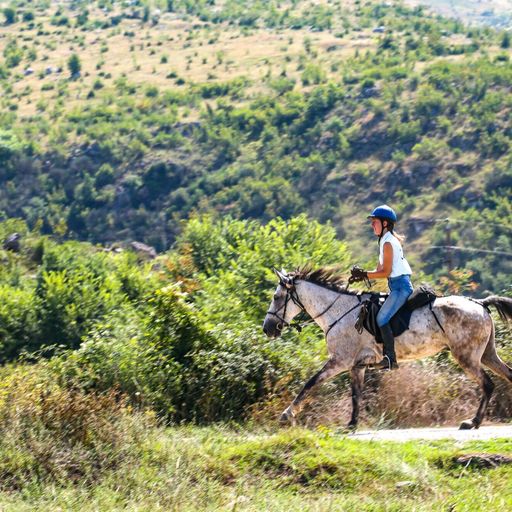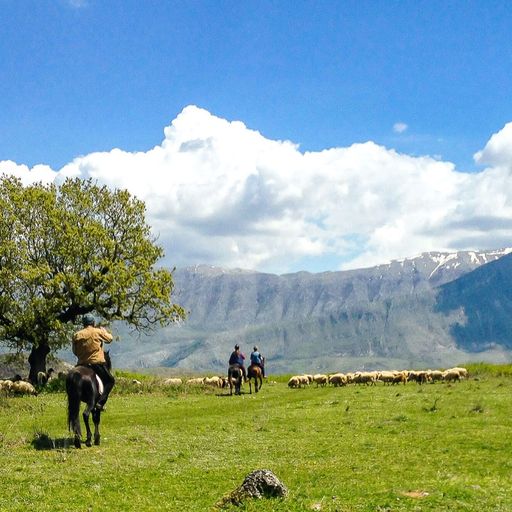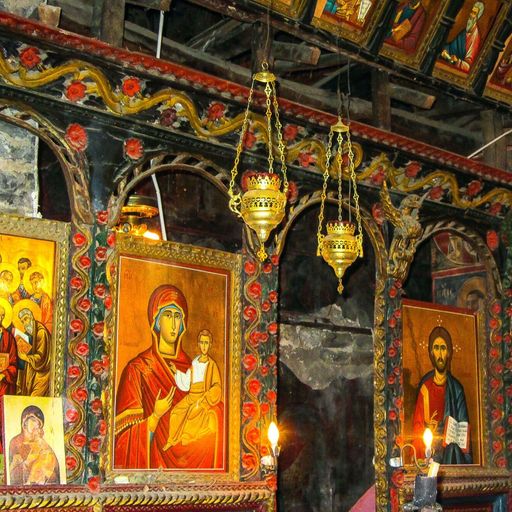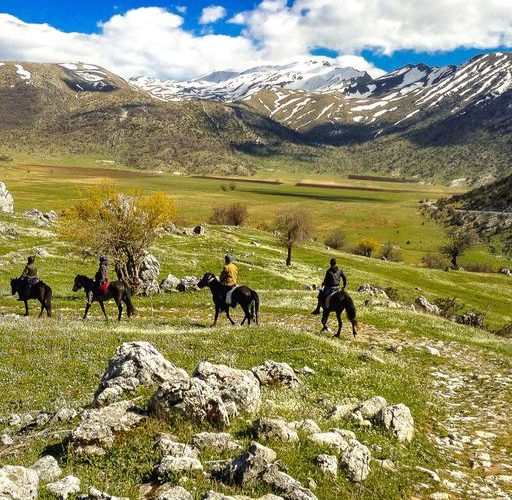

OUR STORY STARTS IN Gjirokastra. This small medieval city located in the south of Albania, roughly a four-hour drive from the country’s only airport, is also a UNESCO world heritage site. It’s perched on the side of a mountain, dominated by an imposing fortress.
We enjoy exploring the town’s winding streets and bazaar before meeting our group at the hotel, seven of us, coming from across the world. Dinner is our chance to get acquainted and to meet our guides, owners of one of the only two equestrian centers in the country.
They ask us about our riding preferences before giving us the names of our horses. Socrates is a philosopher at heart. Propus has a lovely, round canter. I’m given Hektor and told he’s as brave as the Greek hero. My guide also says he is a very “serious” horse. I’m a bit puzzled by this, but suppose it is for me to find out. (Will he wear glasses and a mustache?Does he stay home on a Friday night?)
The skies are blue as we arrive at the stables the following morning. The horses are lined up and waiting for us. I meet my serious horse—he looks at me and tolerates a cuddle. And just like that, we are off on an adventure.
Ride Like a Local
Our first impression as European and North American riders: are we really going to canter along that steep, narrow, stony path? Yes, we are. And guess what? It’s all fine. My horse is like nothing I’ve ever ridden. He’s energetic, quick, and so sure-footed. I soon realize that every horse in our group is the same.
They are all from a local breed that was slowly disappearing before the team started a conservation program. They are small and strong: we are told it’s a cross between Tarpans and Arabians brought over by the Ottomans. After a week of scrambling up and down the mountains, I’d be willing to bet there is a mountain goat streak in there somewhere too.
Hektor is fearless and loves his job. Sometimes his enthusiasm goes a little bit over the top; his name marks him as brave and a fighter, after all, but I know I can trust him to carry me safely across mountains, over rivers, and into deep valleys.
All the horses are shod in a way I’ve never seen before: a full plate with a curved spike over the heel, held in place by three nails on each side. It is unusual, but it does a great job of keeping the stones out, which proves quite useful.

Most of the trail takes us over the ancient pathways built by Ali Pasha so that caravans of Ottoman merchants could drive their wares from village to village. Under the small hooves of our horses, we distinguish old roadways and loose pavement stones, an impressive feat of construction sadly left to fall into ruins for lack of a conservation budget. The same is happening to the Byzantine and Paleo-Christian churches we see throughout the week. Although the locals make some effort to preserve the stunning heritage, there is more to be done, hopefully before time and rivers wash it away.
Responsible Riders
Every day and night, one of us goes out to check and feed the horses. One of the features of this trail ride is that we are responsible for the horses at night; it’s an adventure, not a relaxing holiday. At 8:30a.m., we are usually on horseback, ready for four to six hours in the saddle. Lunches are simple picnics: eggs, tomatoes, byrek (filo pastry pies, normally stuffed with spinach and cheese), olives, bread, and feta cheese. We eat sitting on the ground by a river, on makeshift stone tables by an old mill, at a table near a shepherd’s hut.

We spend the evenings with local families that welcome us into their homes with open arms and enough food to feed three times our group. Many don’t speak much or any English. We learn the basics, which is all we really need. (One word to remember: Gëzuar, cheers.) We puzzled the pieces of their stories together with a bit of sign language, a little French,Russian, and Italian, and a few old photo albums. They are not always joyful. You have to remember that Albania was a dictatorship and a communist state until the implosion of the USSR in 1991. In many ways, the country still bears the scars of that time.
The Many Stories of Albania
We stayed with people whose stories touched us. We learned traditional dances in front of an abandoned school in a village where there were no more children. We shared cups of tea while looking at old family pictures and hearing about the sacrifices a young man made to be with the woman he loved. We all made memories that will stay with us for a long time, well beyond the riding experience.

For more information, and similar trips, visit Equus Journeys.

